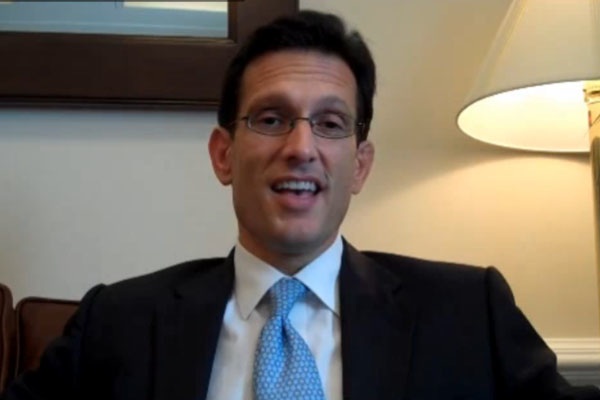House Majority Leader Eric Cantor (R-VA) suggested Tuesday that Congress will allow the country to hit its debt ceiling, and continue to hold out for dramatic spending cuts while the nation approaches a genuine default.
“I think Treasury has, if I’m not mistaken, has put … out a notice that there is a window within which we have to act in order to avoid the eventual default of this country on its debt,” Cantor told reporters at his weekly Capitol briefing. “And I believe that that outside deadline is early July.”
The country will hit the debt ceiling well before early July. In letters last week, Treasury Secretary Timothy Geithner warned Senate Majority Leader Harry Reid (D-NV) and House Speaker John Boehner (R-OH) that the country will hit its debt limit no later than May 16. If Congress hasn’t acted by then, the Obama administration will have to take unusual measures to avoid a default — but they can only buy themselves about six weeks. By about July 8, the country will be in default no matter what.
Republicans view that “outside deadline” as the actual deadline, which means they’re ready to walk to the brink if it means securing yet-to-be-named concessions.
In his letter, Geithner notes that previous Treasury secretaries have resorted to some extraordinary measures to avoid defaulting. He’s pressing them to act before the government reaches that point. Cantor response seems to be: fat chance.
Late update: Cantor spokesperson Laena Fallon notes that Republicans will not allow the country to default, but that they will raise the debt ceiling in the window, defined by the Treasury department, between when the country reaches its borrowing limit, and when it actually defaults on its debt. In an emailed statement, she writes, “The House will consider a debt limit increase within the window put forward by Treasury Secretary Geithner. Should he shift his estimation for necessary action based on revenues or outlays, we will move as well. However, as Republicans have made clear, we will not blindly raise the debt limit without meaningful spending cuts and binding budget reforms to ensure that we don’t continue bad spending practices and max out the credit card in the future.”
In his letters to Congressional leaders, Geithner laid it out like this. “The Treasury Department now projects that the debt limit will be reached no later than May 16, 2011.”
If the debt limit is not increased by May 16, the Treasury Department has authority to take certain extraordinary measures, described in detail in the appendix, to temporarily postpone the date that the United States would otherwise default on its obligations. These actions, which have been employed during previous debt limit impasses, would be exhausted after approximately eight weeks, meaning no headroom to borrow within the limit would be available after about July 8, 2011.
So the window is between May 16 — the day the country’s expected to hit the debt ceiling — and July 8 — the date it will default if no action is taken. Cantor says Congress will act within that window.






